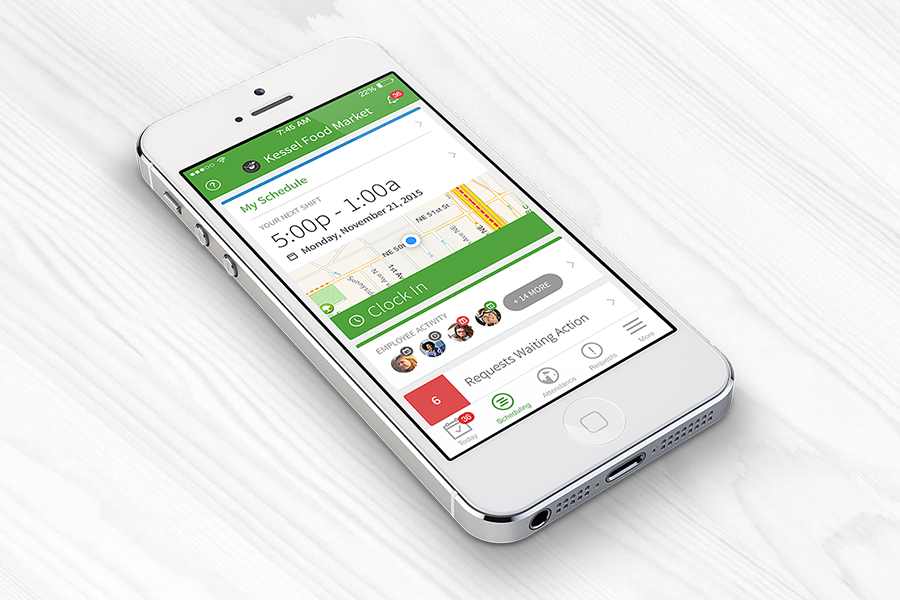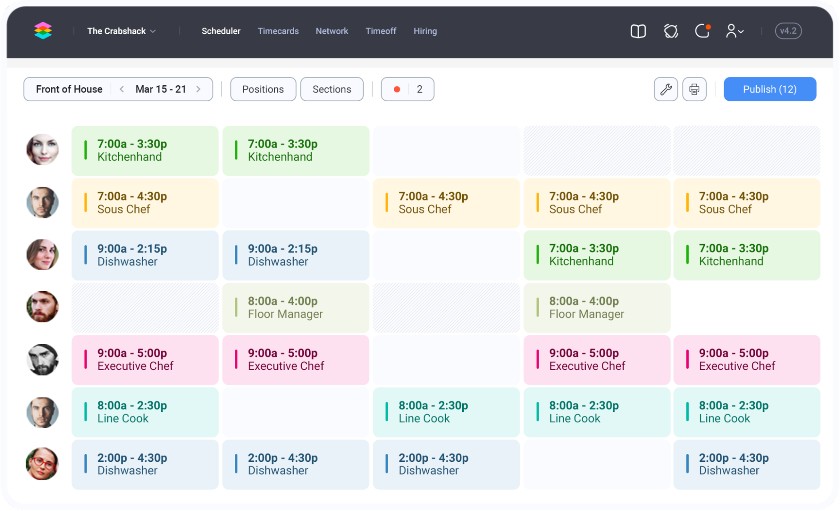The best employee scheduling software is easy to use and affordable, with compliance solutions and an auto-scheduler to help automate the process. In addition to offering an intuitive schedule builder, it should have mobile apps to help managers save time while providing employees with self-service tools for requesting schedule swaps and viewing work shifts online.
To find the best employee scheduling software for small business owners, I evaluated 17 providers and narrowed it down to my top seven.
- Homebase: Best overall, especially for one-location businesses
- When I Work: Best for startups
- 7shifts: Best for restaurants
- Connecteam: Best for flexible scheduling plans
- Deputy: Best for seasonal businesses and catering companies
- SocialSchedules: Best for hospitality businesses that are strict with labor law compliance
- Sling: Best for multi-location small food trucks and mom-and-pop retail shops
Top Employee Scheduling Software Compared
All the employee scheduling software I reviewed offer schedule builders, shift notifications, team messaging, and customizable reporting tools. Mobile apps are also available, allowing you and your employees to access work schedules while on the go. Below are some of the providers’ key features and pricing information.
Pricing Calculator: Do You Want to Compare Costs?
Use the below calculator to compute the estimated monthly and annual costs of the best small business scheduling software on my list.
If you’re still not prepared to use software for scheduling, try our free downloadable employee schedule templates.
Homebase: Best Overall Employee Scheduling Software

Pros
- Easy to set up and navigate
- Caters to an unlimited number of employees
- Responsive customer support
- Feature-rich platform; comes with scheduling, time tracking, team messaging, applicant tracking, and pay processing tools
Cons
- Free version supports only one location with 20 employees
- Labor forecasting tools only available in higher tiers
- Occasional integration issues and mobile app glitches reported by users
Overview
Who should use it:
Homebase is my top-recommended scheduling software for businesses because it has robust tools for managing and tracking employee schedules and attendance.
Why I like it:
Its simple drag-and-drop interface and customizable reporting make it easy to plan work schedules for your team. Employees can also swap shifts, view schedules, and receive alerts via Homebase’s mobile apps. Budget-constrained employers with one-location businesses can benefit from using its free plan, which comes with automated solutions for creating work shifts for up to 20 employees. Best of all, its platform comes with team messaging, payroll, and hiring tools.
These features contributed to this provider’s high ratings in our scheduling and ease of use criteria. However, its user-reported glitches pulled its ratings down. It also scored the lowest in pricing because, unlike When I Work and Deputy, you can’t purchase its scheduling module as a standalone solution, which would have been optimal for businesses that only need schedule planning tools.
- Free trial: 14 days for the All-in-One plan
- Plans
- Basic: $0 for one location and up to 20 employees
- Essentials: $24.95 per location monthly for unlimited employees
- Plus: $59.95 per location monthly for unlimited employees
- All-in-One: $99.95 per location monthly for unlimited employees
- Monthly or annual billing: Both; annual plans let you save 20% but require a lump sum and upfront payment of all yearly fees
- Add-ons
- Payroll: $6 per user monthly + $39 base monthly fee
- Tip manager: $25 per location monthly; includes automatic tip imports from point-of-sale (POS) systems and tip pool calculations
- Background checks: $30 per background check
- Job post boosts: Starts at $79 per job post
- Labor and schedule reporting: In addition to its auto-scheduler tool and automated alerts, Homebase has a wide range of customizable reports to help you gain insight into work shifts, labor expenses, attendance-related performance, and sales—if synced with a POS system. This is unlike Deputy, which offers labor cost reporting only in its highest tier.
- Compliance tools: You automatically get the standard breaks and overtime settings for the state where your business operates. Homebase, which topped our list of best free employee scheduling software, also captures and stores schedule edit histories, including previously run timesheets and reports, for either 90 days or four years (Deputy and 7shifts don’t offer long-term cloud storage for these). This makes complying with the Fair Labor Standards Act (FLSA) and recordkeeping requirements easy.
- Unlimited scheduling: Unlike most of the software in this list, Homebase doesn’t charge per-employee fees or have schedule limits, so you can create as many work shifts as you want. Further, if you grow your workforce, you don’t need to worry about paying extra for additional user seats—provided you upgrade to its paid plans.
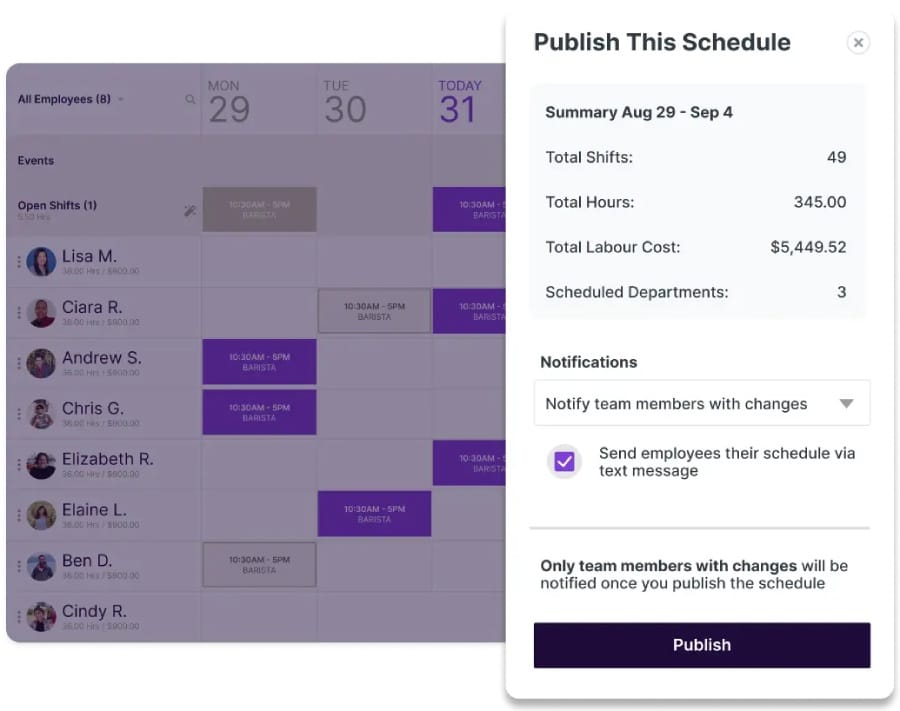
Homebase lets you create and publish schedules from computers, tablets, and smartphones. (Source: Homebase)
When I Work: Best for Startups

Pros
- Simple to set up and use
- Affordably priced; offers a standalone scheduling plan
- GPS location-based scheduling
- Supports multiple schedules and locations
Cons
- Lacks live phone support
- Overtime alerts, labor reports, POS/payroll integrations, and mobile clock-ins with GPS enforcement are included in the Time and Attendance add-on
- Software lags from time to time
Overview
Who should use it:
When I Work is an ideal option for startups and small companies looking for an online platform to plan shifts and communicate with employees.
Why I like it:
It offers affordable and solid solutions for planning work shifts, tracking staff attendance, monitoring labor costs, and messaging employees. Similar to Deputy, it lets you separately purchase its simple-to-use scheduling product, which comes with team messaging functionalities. It even has the lowest-priced standalone scheduling plan on my list, with monthly fees that start at $1.50 per user (Deputy’s plan costs $2.50 per user monthly).
In my evaluation, When I Work earned high marks in scheduling, reporting, and pricing. While users appreciate its schedule builder with a drag-and-drop functionality, it didn’t nab the top spot on my list because of its occasional software lag issues. It also doesn’t offer live phone support and lacks the free plan that most of the providers I reviewed offer.
- Free trial: 14 days
- Plans
- Essentials: $1.50 per user monthly for scheduling and messaging tools; $3 per user monthly if with time tracking features
- Pro: $3 per user monthly for scheduling and messaging tools; $5 per user monthly if with time tracking features
- Premium: $5 per user monthly for scheduling and messaging tools; $7 per user monthly if with time tracking features
- Monthly or annual billing: Month-to-month billing
- GPS-based employee scheduling: When I Work lets you add GPS details of job sites to shifts so employees know where they should report for work (Homebase doesn’t have this). Then, you can use its mobile time clock apps to monitor whether or not your staff with job site assignments clock in at the location you specified.
- Smart reporting: When I Work has automated reports that provide insight into your business and workforce. These include real-time labor distribution reports that allow you and your managers to see how the planned labor budget compares to actual labor costs (including overtime).
- Simple-to-use scheduling tools: When I Work offers a scheduling tool that’s intuitive and easy to use. With just a few simple clicks, you can create shifts, share work schedules with your team, track actual work hours, and message employees. You can also copy shifts, create templates, and schedule shifts multiple weeks out. These features help save you time, allowing you to focus on growing your business.
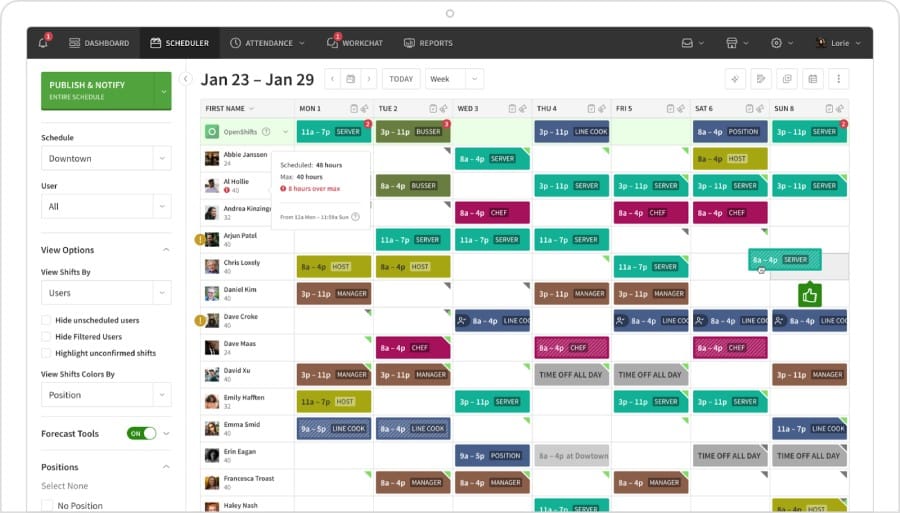
With When I Work’s online schedule builder, you can easily assign shifts to employees, given its drag-and-drop functionality. (Source: When I Work)
7shifts: Best for Restaurants
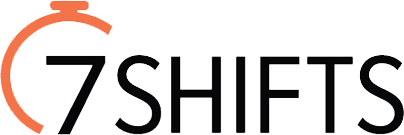
Pros
- Intuitive interface
- Has a machine-learning auto-scheduler tool
- Offers robust reports and POS integration options
- Basic job postings and applicant tracking features included in the free plan
Cons
- Free plan covers only 30 employees and one location; doesn’t include customer support
- Lacks phone support (only offers chat assistance); live support available in paid plans
- Occasional mobile app glitches and integration issues reported by users
Overview
Who should use it:
7shifts is optimal for those with simple to complex restaurant scheduling requirements as it provides all the essential tools for managing employees.
Why I like it:
7shifts is a cloud-based scheduling software created specifically for restaurants. In addition to its intuitive drag-and-drop schedule builder and restaurant-friendly time-tracking tools, it offers robust reporting that allows you to see how your business locations perform in terms of sales, labor costs, and employee management.
In my evaluation, I gave this provider high scores in schedule planning, reporting, ease of use, and popularity among users. However, its lack of live phone support cost it several points. In addition, its free plan only supports sales data integration with POS devices. You have to upgrade to a paid tier if you want to track employee attendance and schedules via POS systems and if you need to connect 7shifts to payroll software.
- Free trial: 14 days
- Plans
- Comp: $0 for one location and up to 30 users
- Entree: $34.99 per location monthly for up to 30 users
- The Works: $76.99 per location monthly for unlimited users
- Gourmet: $150 per location monthly for unlimited users
- Monthly or annual billing: Both; annual plans let you save 10% but require a lump sum and upfront payment of all yearly fees
- Add-ons
- 7shifts payroll: $6 per user monthly + $39 per location monthly
- Tip pooling: Starts at $24.99 per location monthly; includes tools to create, compute, and track tip pools
- Tip payouts: $49.99 per location monthly + 1% per transaction
- Task management: $12.99 per location monthly
- Employee onboarding: $2.99 per onboarding packet sent
- Manager log book: $14.99 per location monthly; includes a customizable digital log book to keep managers in sync and updated across shifts
- Operations overview: $6.99 per location monthly; lets you track labor performance and employee engagement across all your locations in one place
- Restaurant-specific reporting: In addition to tip reporting, 7shifts has real-time labor reports and restaurant performance dashboards that provide a birds-eye view of your entire business operations (via the Enterprise Dashboard), including how all the restaurants are performing and which locations may need extra attention (through the Location Overview). Other software in this list either don’t have this type of reporting, or the restaurant-specific reports aren’t as extensive.
- POS integrations: Compared to the other providers on my list, 7shifts has a wider network of partner POS solutions. It can integrate with more than 20 POS systems, such as Aloha, Micros, Dinerware, Square POS, Revel, POSitouch, Squirrel Systems, and Heartland Restaurant POS.
- Compliance tools: You get audit logs, automated alerts, break and overtime settings, and early clock-in prevention. 7shifts can also help you to avoid assigning “clopen” shifts. This ensures that employees get ample rest between schedules instead of working a closing shift and then an opening shift immediately the following day.
- Smart employee scheduling: Included in 7shifts’s Gourmet tier, its machine-learning employee scheduling tool automatically creates work shifts based on your restaurant’s workforce demands, labor cost and sales forecasts, and overtime compliance requirements, including the weather forecast for the day and your employees’ skills, schedule availability, and approved PTO. Only Deputy offers a comparable auto-scheduling feature.
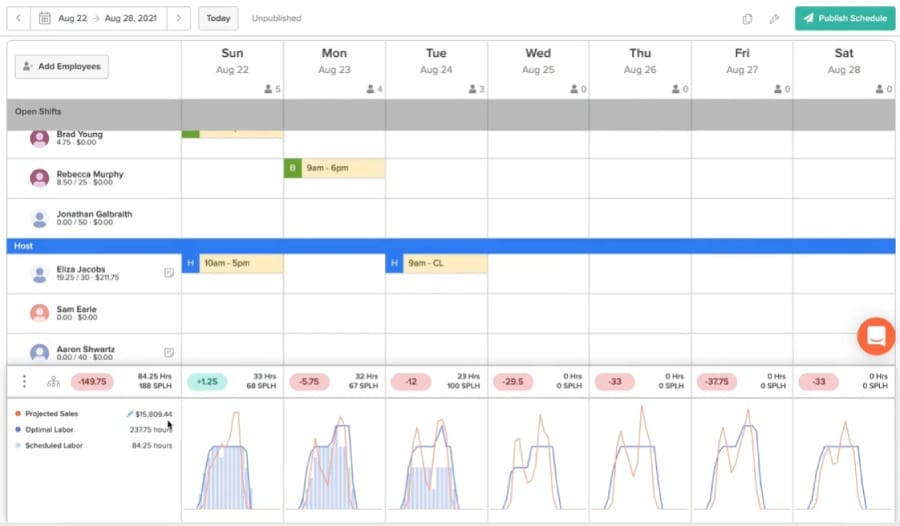
7shifts has smart scheduling tools that can help you create labor-optimal schedules. (Source: 7shifts)
Connecteam: Best for Flexible Scheduling Plans

Pros
- Easy to use
- Free plan (for businesses with up to 10 workers) includes full access to all of its features
- Solid task delegation and employee certification/training tracking tools
Cons
- No auto-scheduling
- Lacks live support
- Limited integration options
Overview
Who should use it:
Connecteam is ideal for small businesses looking for flexible plans that let them choose the essential workforce management tools they need, such as staff scheduling, task management, and team communication features.
Why I like it:
What makes Connecteam unique from the other providers I reviewed is its flexibility. It has different modules or hubs that contain a wide range of HR features, and you can match each with four paid plans to get basic to advanced tools. Plus, if you only have up to 10 employees, you can sign up for the free Small Business option, which includes full access to all of its functionalities.
While its HR suite lacks the hiring and pay processing tools that Homebase and 7shifts offer, it has efficient scheduling and time tracking tools. It also lets you delegate tasks and manage learning courses. The systems on my list don’t have training solutions.
These features and Connecteam’s user-friendly platform contributed to its high marks in ease of use and staff scheduling. However, the limited report customization options and the lack of phone support brought its overall score down.
With Connecteam, you have to choose a plan and pair it with a hub or module. There are five plans and four hubs, each with different functionalities. You can select different plans for each hub, except for the Small Business package, because it contains all of Connecteam’s features.
- Free trial: 14 days
- Free plan
- Small Business: $0 for up to 10 users; includes full access to all hubs and features
- Plans
- Basic: $35 monthly for the first 30 users plus 60 cents monthly for each additional user
- Advanced: $59 monthly for the first 30 users plus $1.80 monthly for each additional user
- Expert: $119 monthly for the first 30 users plus $3.60 monthly for each additional user
- Enterprise: Call for a quote
- Hubs
- Operations: Includes job scheduling, task management, online forms and checklists, and a time clock with geofencing tools
- Communications: Includes organizational charts, updates and announcements, chats, surveys, events, a staff directory, and a knowledge base tool
- HR & Skills: Includes time off tracking, training course management, online quizzes, employee recognition and rewards, and document management tools
- Monthly or annual billing: Both; annual plans let you save 18% but require a lump sum and upfront payment of all yearly fees
- Employee communications: You can set push notifications to help remind your team about their coming shift or to inform them when they’re about to reach their daily work-hour limit. Plus, you can add notes, locations, or files to members assigned to tasks. If you get its Expert plan, you can even use automated follow-up features, making it more convenient to provide and receive feedback on tasks.
- Task tools: Aside from assigning tasks and sub-tasks, you can attach forms, photos, files, and voice recordings to work assignments. Employees can add updates to their assigned tasks, and you (or your people managers) can view the updates in real time. It also allows you to create reminders for shift-related tasks or complete required learning courses for specific jobs.
- HR functions: Connecteam’s online platform offers more than just scheduling and time-tracking solutions. It can store staff information and documents and send surveys if you want to gain insight into employee engagement levels. A library of pre-made topic and industry-specific learning courses is also available, but you can create your own training program.
- Staff scheduling: Similar to most of the providers in this list, Connecteam has a drag-and-drop interface for creating staff schedules. You can add shifts to a template or even load one from a file. You can also set daily or weekly hours limits to prevent overscheduling workers and even offer open shifts to employees (this comes with real-time alerts if a shift is accepted).
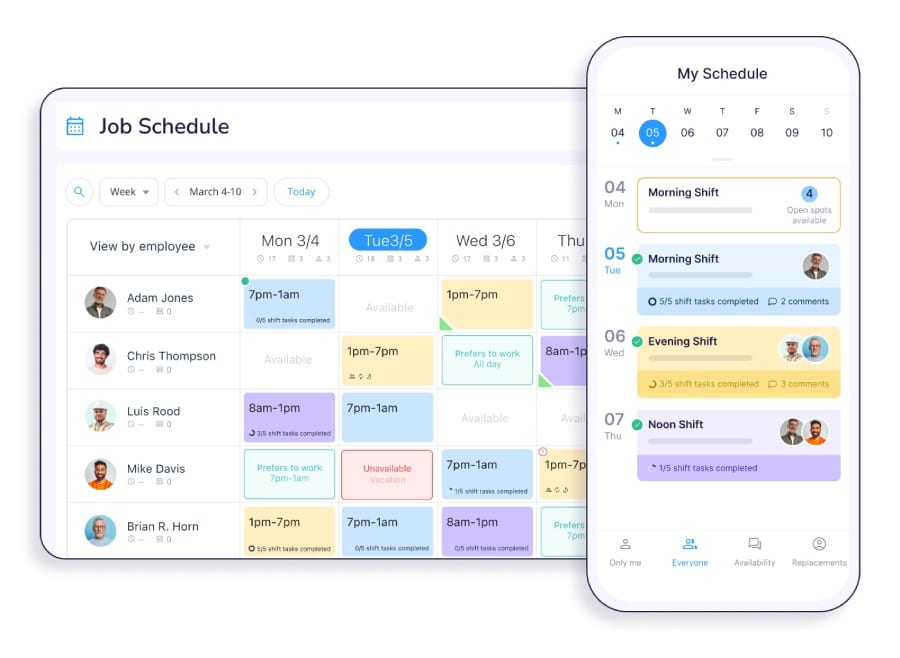
Create schedules from scratch, from a template, or from a file with Connecteam. (Source: Connecteam)
Deputy: Best for Seasonal Businesses and Catering Companies

Pros
- Efficient scheduling and labor forecasting tools
- Affordable plans; with option to purchase standalone time tracking and employee scheduling modules
- Offers 24/7 customer support
Cons
- Free plan only for US users
- Paid tiers have a minimum spend requirement per month
- Occasional mobile app glitches and third-party integration issues
Overview
Who should use it:
I consider Deputy the best scheduling app for seasonal businesses and those holding special events (like catering functions and conventions) mainly because of its Flexi Weekly plan.
Why I like it:
Deputy lets you create schedules and track employee attendance based on your business’ manpower needs during high and low seasons. It will only charge full rates for active employees and minimal fees for inactive workers. This is unlike the other providers on my list, which require you to archive or drop inactive employees from their systems.
In my evaluation, I gave Deputy high ratings in pricing, popularity, and reporting tools. While it allows you to build rules-based schedules, send messages, and assign shift tasks, it scored the lowest scheduling features because many of its tools are only available in higher tiers. It also didn’t get a high rating in ease of use despite its user-friendly platform because it doesn’t have live phone support (only offers assistance through email and chat).
- Free trial: 31 days
- Plans
- Starter: $0; includes 100 shifts and 100 timesheets per month
- Premium: $6 per user monthly
- Enterprise: Call for a quote
- Special package
- Flexi Weekly: $2.50 per active user weekly + 50 cents per inactive user weekly; for seasonal businesses
- Standalone plans
- Scheduling: $4.50 per user monthly
- Time and attendance: $4.50 per user monthly
- Plan requirements: Deputy requires a minimum monthly spend of $25 per invoice on its paid plans (except the Flexi Weekly option)
- Monthly or annual billing: Both; annual plans let you save 16% but require a lump sum and upfront payment of all yearly fees
- Labor compliance tools: Deputy has smart wage and hour compliance tools (although not as robust as those of SocialSchedules) designed to help keep you compliant with labor laws and protect your business from potential risks. Its features include meal and rest breaks settings, fair workweek rules, compliance alerts, and “clopen” notifications to help prevent you from assigning opening schedules to workers who came from closing shifts.
- Time tracking: In addition to scheduling solutions, you get time clock apps that allow you to track employee attendance and manage your workforce from any mobile device, including the Apple Watch. Its apps for tablets even support touchless clock-ins, enabling your employees to start and end their shifts through facial recognition and voice commands. The other software in this list doesn’t support voice command clock-ins/outs and time tracking through the Apple Watch.
- Employee scheduling: For businesses that only need scheduling tools, Deputy offers an affordable solution for creating, managing, and sharing employee work shifts through its mobile apps. You can simply drag-and-drop shifts or use its AI-powered scheduler to build demand-based work shifts with a single click. It can handle shift swaps and recurring schedules and even lets you add rules for easier overtime and break planning.
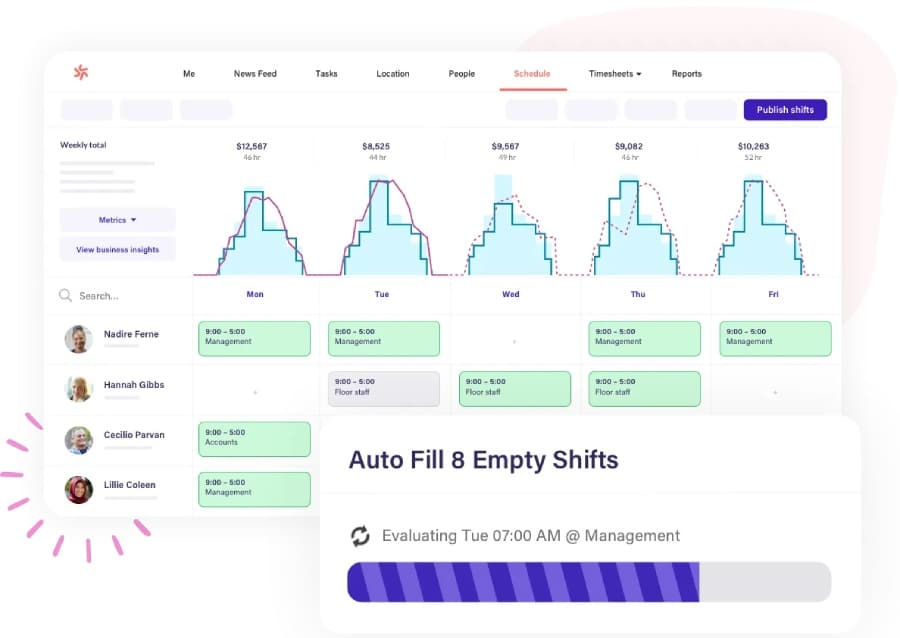
Deputy’s auto-scheduler predicts your staffing requirements based on sales data, labor percentages, staff availability, and demand trends. (Source: Deputy)
SocialSchedules: Best for Hospitality Businesses Requiring Strict Labor Law Compliance Tools

Pros
- User-friendly with a simple and visually appealing interface
- Robust compliance tools
- Its free tier includes access to restaurant-specific candidate search tools
Cons
- Free plan covers only 10 scheduled workers and one department in one location
- Multi-location scheduling and dedicated customer support available only in highest tier
- Mobile app is glitchy
Overview
Who should use it:
SocialSchedules’ employee scheduling solutions are designed to reduce compliance risks for hospitality-based businesses with multiple departments and locations, making it an ideal option for those who require strong compliance tools.
Why I like it:
With SocialSchedules, you can create compliance rules that will guide your scheduling options and help you avoid penalties. It even sends notifications and mobile alerts for overtime and breaks that don’t comply with state and local labor laws.
In my evaluation, SocialSchedules earned high ratings in staff scheduling functionalities, reporting, and ease of use. However, it lost several points because while it can handle multi-location and unlimited employee scheduling, including overtime reporting, you must subscribe to its paid plans to access these functionalities. It also doesn’t have phone support—you only get a dedicated support contact if you purchase its highest tier.
Sling: Best for Small Food Trucks & Mom-and-Pop Retail Shops

Pros
- Easy to use
- Free tier; with affordably-priced paid plans
- All plans include unlimited employees, managers, and schedules
Cons
- Rest break planning, time tracking, and shift tasking, and group messaging available only in paid plans
- Free version doesn’t include shift swaps and schedule templates
- Lacks live phone support
Overview
Who should use it:
Sling’s affordable plans include essential tools for planning work shifts, tracking attendance, assigning tasks, and monitoring labor costs for unlimited locations and employees. This makes it a good option for budget-constrained small food trucks and retail shops with multiple locations.
Why I like it:
Sling has one of the lowest per-employee monthly fees in this guide, with its starter plan costing only $2 per user monthly. The other providers on our list, except for When I Work, have starter per-employee fees of $2.50 and up per month. Sharing company updates is also easy with its newsfeed, which can be configured to show organization-wide or location-based announcements.
Its easy-to-use time clocks and scheduling functionalities, helpful reports, smart alerts, and solid compliance solutions for planning breaks and overtime pushed its overall scores up. It didn’t get a higher score because it lacks phone support and requires an upgrade to its paid plans to get time-tracking features. Plus, its number of user reviews on G2 and Capterra is below 1,000 as of this writing.
- Free trial: 15 days
- Plans
- Free: $0 for up to 50 users
- Premium: $2 per user monthly
- Business: $4 per user monthly
- Monthly or annual billing: Both; annual plans let you save 15% but require a lump sum and upfront payment of all yearly fees
- Task creation and templates: Sling lets you create task templates, assign tasks to employees, and set tasks as recurring work assignments. Managers can also leave online feedback and attach task lists to remind workers of what they need to do during a shift.
- Employee communications and alerts: Aside from messaging tools, it offers an online newsfeed for sharing announcements and keeps workers up to date with the latest company policies and activities. In addition to task lists, Sling (like the others on my list) offers both messaging and an interactive news feed, so you can keep your employees up to date on policies or events. Sling also sends attendance- and schedule-related alerts for shift swaps and late clock-ins.
- Multi-position and compliance scheduling: With Sling, you can plan shifts for employees who hold multiple job roles (such as waiter and cashier). It even notifies you if you plan a job shift for an employee who is scheduled to work in a different role during the same timeframe or if there are scheduling conflicts. Similar to the other solutions in this guide, its compliance tools help you plan overtime and meal breaks for your team, as well as track labor costs and monitor holiday pay rules.
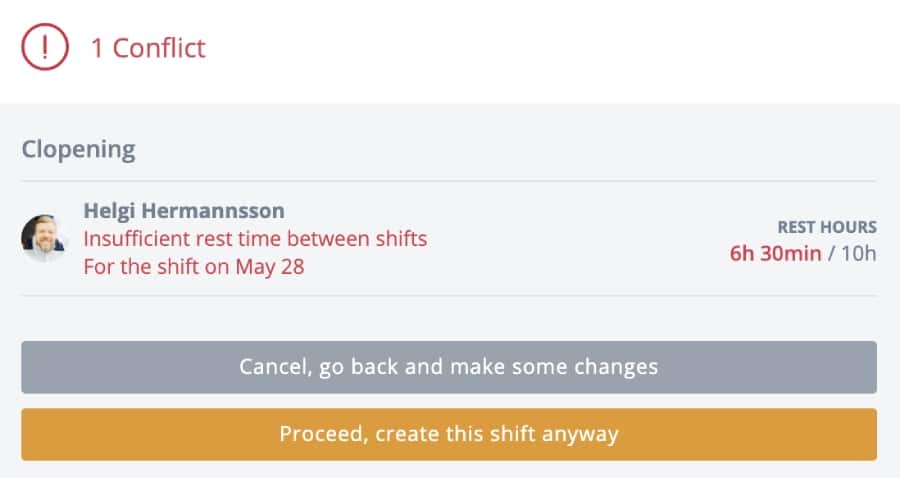
Sling notifies you of any scheduling conflicts when planning work shifts. (Source: Sling)
How to Choose the Best Scheduling Software
In choosing the best small business employee scheduling software, consider the following factors:
- Size of your workforce
- Number of business locations
- Your budget (note that scheduling software for business owners can cost anywhere from $3 to more than $10 per user monthly)
- Essential features, such as schedule builders, shift swapping, staff availability management, automated reminders, reporting tools, and compliance solutions for planning breaks and overtime
- Ease of use
- Integration with HR solutions (such as payroll) and essential business systems (such as POS and invoicing software)
- Support services (such as 24/7 assistance and live phone support)
Methodology: How I Evaluated the Best Employee Scheduling Software
To help you find the best small business scheduling software for your organization, I compared 17 employee scheduling software that offer reasonably priced plans. I gave more consideration to those with free tiers and transparent pricing. Then, I looked for essential staff scheduling features, such as auto-scheduling, overtime and break management, reporting, and shift swapping. I also considered ease of use, customer support, software integration options, and feedback from actual users.
To view the full evaluation criteria, click through the tabs in the box below.
25% of Overall Score
The best employee scheduling software includes at least basic tools, such as shift swapping, overtime, break, and paid time off planning. Plus, having access to team messaging, multi-location scheduling, mobile apps, and a self-service portal is also ideal.
25% of Overall Score
Having an employee scheduling platform that’s intuitive and easy to learn is a must. I looked at whether the provider offers live phone support, client training, and integration options with payroll, point-of-sale (POS), and timekeeping systems.
30% of Overall Score
In addition to transparent pricing, I checked if its scheduling solution can be accessed or purchased separately from the provider’s other software products. I also considered the billing arrangements, giving more points to those with either monthly or both monthly and annual options.
10% of Overall Score
In addition to having access to standard and pre-built reports, I checked if users can customize reports.
10% of Overall Score
I checked reviews that actual users left on third-party sites like G2 and Capterra. Providers that received more than a 4-star rating and had fewer complaints got a higher score.
Frequently Asked Questions (FAQs) About Employee Scheduling Software
The commonly used 9 to 5 schedule is close to an ideal option, where employees work eight hours and take one-hour lunch breaks during workdays. This schedule makes it easy for you to plan work tasks while providing workers with a routine to find work-life balance.
The best app for planning rotating schedules enables you to plan work shifts in advance and create templates, saving you time from building schedules from scratch. It should have team availability tools, allowing you to see planned PTOs and employee schedule preferences. The app should also be flexible enough to allow schedule swaps and last-minute shift adjustments if needed, with team communication features to make schedule change announcements easy.
The best free employee software scheduling software should be intuitive and user-friendly. It should have a drag-and-drop shift builder with color-coded positions or schedules for easy viewing. It should also offer features like schedule templates, time off and availability tracking, shift alerts with real-time updates, and the capability to allow employees to swap and claim schedules.


